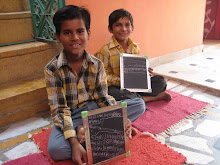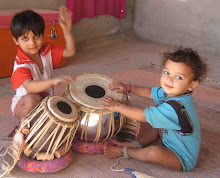The Merasi School is remarkable. But, in truth, there's nothing remarkable about that. Every person, work of architecture, afterschool program and fingerpainting on the fridge is worth making a remark about. Remarkability has a few different shades to it, though, and that's where Sarwar and I are particularly attentive.
Part of what distinguishes The Merasi School is that it offers kids an opportunity to explore worlds of knowledge, databases of information and patterns of thought that were previously locked far away from their inquiring minds. With this new influx of ideas and stimulus, the world becomes a bit more colorful and expansive and, ideally accessible. Which is part of what we're trying to do.
The other side of that equation, though, is that once an individual begins to see the scope of the world beyond their own and develops the educational capacities to influence and shape that world, the classic brain drain question emerges: Why should they stay home? What is to keep them from going off to bigger, brighter more open cities where caste doesn't dictate social interaction and they can be valued for the quality of their heart and mind?
Here's what makes The Merasi School remarkable: The music. The Merasi have a precious, gorgeous artistic legacy woven into the narrative fabric of Jaisalmer and Rajasthan. The songs are the oral history of a culture that doesn't exist anywhere else in the world. The rhythms and beats the students learn in music class with teacher Karim Khan are situated in a particular landscape. With education, our little ones are honing the fine, constructive skills to shift the heart and soul of that landscape.
It's not a flawless plan. Perhaps some students will get a taste of broader worlds and never look back. Yet many are already showing signs of sinking their heels further into their communities. As they do that, they each contribute to the expansion of the hope and possibility in their own backyard.
Friday, February 20, 2009
Subscribe to:
Posts (Atom)

